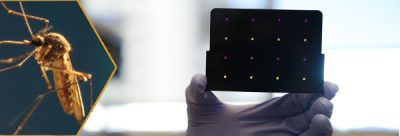Disruptive#6: Rapid, Low-cost, Paper-based Test for Zika
Written on June 24th, 2016McNally:
Hello, I’m Terrence McNally and you’re listening to Disruptive, the podcast from Harvard’s Wyss Institute for biologically inspired engineering. In early May, a low cost, rapid, paper-based diagnostic system for strain specific detection of the Zika virus was introduced by an international consortium of researchers led by synthetic biologist James Collins with the goal that it could soon be used in the field to screen blood, urine or saliva samples.
The core of the test kit is a piece of paper that changes color in the presence of Zika virus RNA and produces results in two to three hours. Much faster and cheaper than the PCR test used now according to Collins, a Wyss core faculty member – and it should cost less than a dollar per test adds University of Toronto biochemist Keith Pardee.
I’m going to speak with both of them about the real time story of a crisis
inciting innovation. How a team from a number of different institutions came together, and in a matter of six weeks developed a new approach to detection and designed a system to deploy in the face of future pandemics. Collins says, in response to an emerging outbreak, a custom tailored diagnostic system could be ready for use within one week’s time. We’ll explore how they did it, what they’ve learned and what this might mean for the future.
The mission of the Wyss Institute is to transform healthcare industry and the environment by emulating the way nature builds. Our bodies and all living systems accomplish tasks far more sophisticated and dynamic than any entity yet designed by humans. By emulating nature’s principles for self organizing and self regulating, Wyss researchers develop innovative engineering solutions for healthcare, energy, architecture, robotics and manufacturing.
In addition to leading the Living Cellular Devices and cellular devices platform at the Wyss, Jim Collins is the Termeer professor of medical engineering and science and professor of biological engineering at MIT. He’s a member of the Harvard MIT health sciences and technology faculty and an institute member of the Broad Instiute of MIT and Harvard.
Collins received a BA in physics from Holy Cross and a PHD in medical engineering from Oxford. A Rhodes Scholar, a MacArthur Fellow and a winner of the National Institutes of Health Directors Pioneer Award. Jim is one of the founders of synthetic biology as well as a pioneering researcher in systems biology and his engineering ranges from the physical scale of wearable medical devices to that of molecules.
Collins says he found early inspiration both in the space program and much closer to home.
Collins: [02:38]
I was born and grew up initially in New York City. My dad was an electrical engineer who had worked in the aviation industry so he did work for NASA, he did work for the military, he did work for a number of companies building planes. My mom was a math teacher.
Continue reading “Disruptive#6: Rapid, Low-cost, Paper-based Test for Zika”

